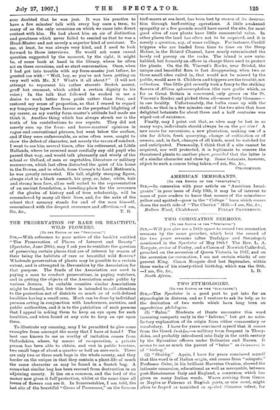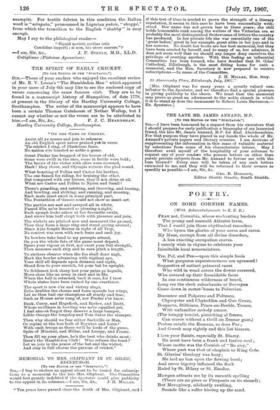TWO ETYMOLOGIES.
[TO THE EDITOR OF TUE"SPECTATOR."1
SIR,—The Spectator is a good port to put into for an etymologist in distress, and so I venture to ask its help as to the derivation of two words which have long been an opprobrium, philologiae.
(1) "Balzo." Students of Dante encounter this word (meaning rampart) early in the "Inferno," but get no satis- factory explanation of its origin from either commentary or vocabulary. I have for years convinced myself that it conies from the Greek -'‘TraeLs-,—a. military term frequent in Thucy- dides, and probably introduced into Italy in the sixth century by the Byzantine officers under Belisarius and Narses. It seems to me as much the parent of " balzo " as ivicncovor is of " bishop."
(2) "Shabby." Again, I have for years convinced myself that this word is of Italian origin, and comes from " sciupato." Professor Osier, in his brilliant Harveian Oration, showed the intimate connexion, educational as well as mercantile, between post-Renaissance Italy and England, a connexion which has given us many Italian words. Wares arriving from Genoa or Naples or Palermo at English ports, or vice versci, might often be frayed or tarnished or spoiled (Genoese velvet, for
example). For textile fabrics in this condition the Italian word is " sciupato," pronounced in Ligurian patois, " shuppe," from which the transition to the English " shabby " is easy enough.
May I say to the philological reader-
" Siquid novisti rectius istis Candidus imperti ; al non, his utere mecum" ?
am, Sir, &c., J. P. STEELE, M.D., LL.D.
Cutigliano (Pistoiese Apennines).







































 Previous page
Previous page